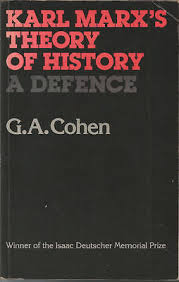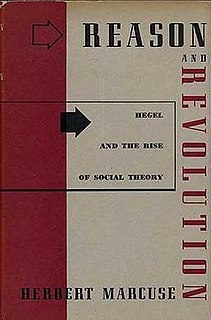 W
WThe Cambridge Companion to Marx is a 1991 collection of articles about the philosopher Karl Marx edited by the political theorist Terrell Carver. The book received both positive and mixed reviews. Reviewers questioned the inclusion or exclusion of particular topics, but praised some of the contributions.
 W
WThe Concept of Nature in Marx is a 1962 book by the philosopher Alfred Schmidt. First published in English in 1971, it is a classic account of Karl Marx's ideas about nature.
 W
WThe Death of God and the Meaning of Life is a book by Julian Young, in which the author examines the meaning of life in today's secular, post-religious scientific world.
The Development of the Monist View of History is the major work of the Russian philosopher Georgi Plekhanov, published in 1895. Plekhanov gives an account of modern social and philosophical thought as culminating in Georg Wilhelm Friedrich Hegel and Karl Marx and seen through the materialism of Ludwig Feuerbach.
 W
WFor Marx is a 1965 book by the philosopher Louis Althusser, a leading theoretician of the French Communist Party, in which the author reinterprets the work of the philosopher Karl Marx, proposing an epistemological break between the young, Hegelian Marx, and the old Marx, the author of Das Kapital (1867–1883). The book, first published in France by François Maspero, established Althusser's reputation. However, Althusser later criticized the work, believing that in it he had neglected the class struggle.
 W
WHistory, Labour, and Freedom: Themes from Marx is a 1988 book by the philosopher G. A. Cohen.
 W
WAn Introduction to Karl Marx is a 1986 book about the philosopher Karl Marx by the social and political theorist Jon Elster. It is a much shorter version of Elster's Making Sense of Marx, published a year earlier.
 W
WKarl Marx and the Close of His System is an 1896 book about the philosopher Karl Marx by the Austrian economist Eugen von Böhm-Bawerk, in which the author critiques Marx's economic theories.
 W
WKarl Marx's Theory of History: A Defence is a 1978 book by the philosopher G. A. Cohen, the culmination of his attempts to reformulate Karl Marx's doctrines of alienation, exploitation, and historical materialism. Cohen, who interprets Marxism as a scientific theory of history, applies the techniques of analytic philosophy to the elucidation and defence of Marx's materialist conception of history.
 W
WKarl Marx's Theory of Revolution is a 5-volume work (1977–1990) about the philosopher Karl Marx by the Marxist writer Hal Draper. First published by the Monthly Review Press, the book received positive reviews, praising it as a fair and well-written work that discredited misconceptions about Marx and his work. However, some reviewers considered it insufficiently critical of Marx.
 W
WKnowledge and Human Interests is a 1968 book by the German philosopher Jürgen Habermas, in which the author discusses the development of the modern natural and human sciences. He criticizes Sigmund Freud, arguing that psychoanalysis is a branch of the humanities rather than a science, and provides a critique of the philosopher Friedrich Nietzsche.
 W
WLibidinal Economy is a 1974 book by the French philosopher Jean-François Lyotard. The work has been compared to the philosopher Gilles Deleuze and the psychoanalyst Félix Guattari's Anti-Oedipus (1972). Critics have argued that the work lacks a moral or political orientation. Lyotard subsequently abandoned its views and developed an interest in postmodernism.
 W
WMaking Sense of Marx is a 1985 book about Karl Marx by the social and political theorist Jon Elster, in which the author reevaluates Marx's ideas. The book has received a mixture of praise and criticism from commentators.
 W
WMarx and Modern Economics is a 1968 book about the philosopher Karl Marx edited by David Horowitz.
 W
WMarx in the Mid-Twentieth Century: A Yugoslav Philosopher Reconsiders Karl Marx's Writings is a 1965 book about the philosopher Karl Marx by the philosopher Gajo Petrović.
 W
WMarx's Revenge: The Resurgence of Capitalism and the Death of Statist Socialism is a 2002 book about the contemporary relevance of the philosopher Karl Marx by the economist Meghnad Desai.
 W
WMarx's Theory of Alienation is a 1970 book about Karl Marx's theory of alienation by the philosopher István Mészáros. The work has received a mixture of praise and criticism from scholars.
 W
WMarx's Theory of Ideology is a 1982 book about Karl Marx by the political theorist Bhikhu Parekh. The work was inspired by Parekh's experience of racial discrimination in British society.
 W
WThe Open Society and Its Enemies is a work on political philosophy by the philosopher Karl Popper, in which the author presents a "defence of the open society against its enemies", and offers a critique of theories of teleological historicism, according to which history unfolds inexorably according to universal laws. Popper indicts Plato, Georg Wilhelm Friedrich Hegel, and Karl Marx as totalitarian for relying on historicism to underpin their political philosophies, though his interpretations of all three philosophers have been criticized.
 W
WThe Pirates! in an Adventure with Communists is the third book in The Pirates! series by Gideon Defoe to feature his hapless pirate crew. It was published in 2006 by Orion Books (ISBN 0-297-84867-4).
 W
WReason and Revolution: Hegel and the Rise of Social Theory is a book by the philosopher Herbert Marcuse, in which the author discusses the social theories of the philosophers Georg Wilhelm Friedrich Hegel and Karl Marx. Marcuse reinterprets Hegel, with the aim of demonstrating that Hegel's basic concepts are hostile to the tendencies that led to fascism.
 W
WThe Social and Political Thought of Karl Marx is a 1968 book about the philosopher Karl Marx by the political scientist Shlomo Avineri. Commentators have praised the book, which received positive reviews and has become a classic.
 W
WStudies in the Labour Theory of Value is a book about the labor theory of value by the economist Ronald L. Meek. The book has been praised by commentators.
 W
WStudies on Marx and Hegel is a 1955 book about the philosophers Karl Marx and Georg Wilhelm Friedrich Hegel by the French philosopher Jean Hyppolite. Commentators have praised the book, which has been credited with showing Hegel's anticipation of existentialism.